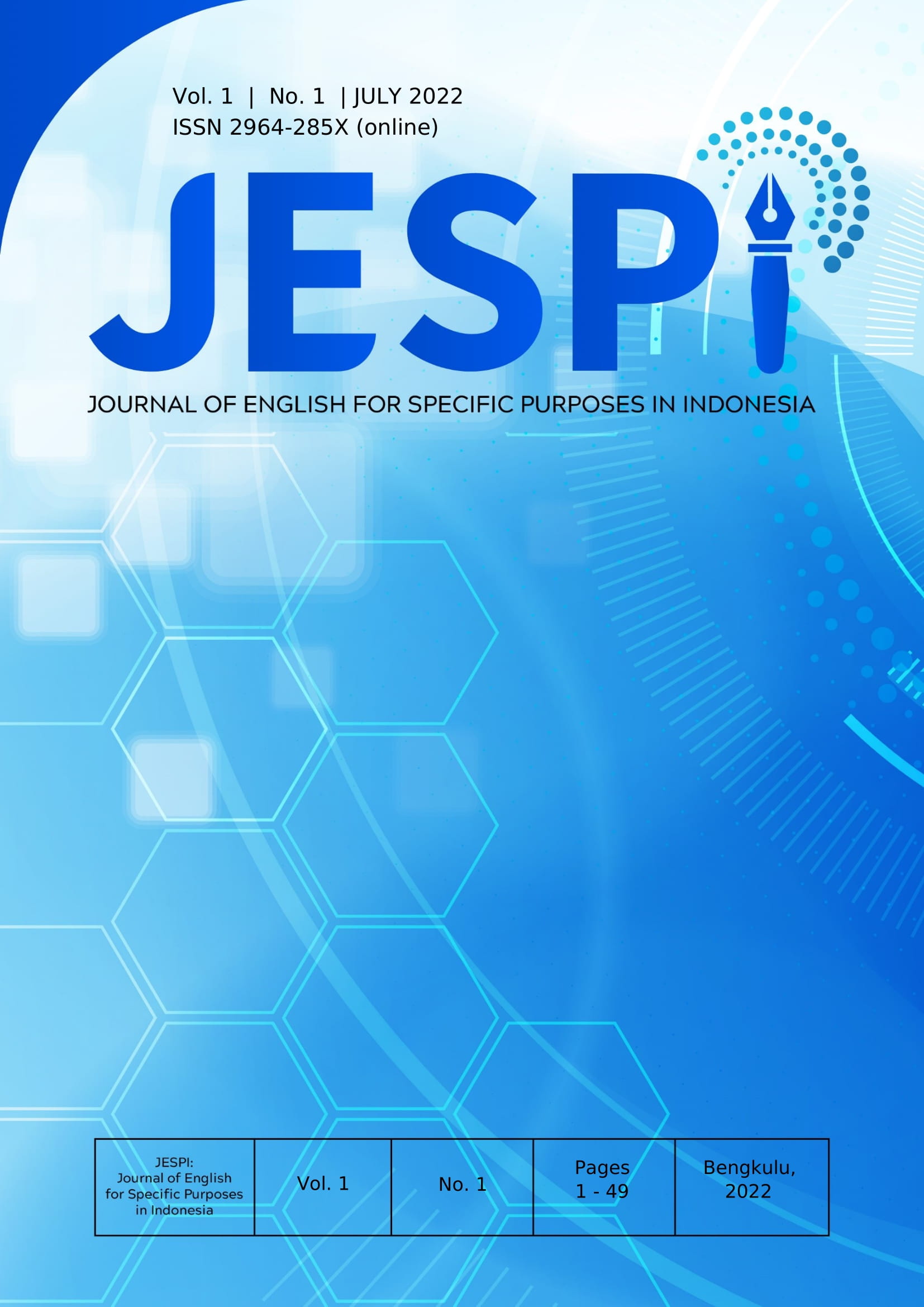Main Article Content
Abstract
English is the main act in communicating internationally. English is
used as an official language in the global community to make
anything that happens smooth and understanding, such as business
field, medical, politics, and also education. Language courses are
also not something unfamiliar in the countries, to reckon that is how
important English to be mastered by people nowadays. The findings
of this study should aid students and teachers in improving their
understanding of how code-mixing and code-switching will affect
students' skills in speaking English. The data for this sample is taken
from an Instagram reels video from an English study account called
Englishvit (@englishvit). The result shows that for code-mixing, the
L1+L2 type is the highest percentage of lexical items. For codeswitching, L2 without translation is the highest percentage for the
lexical items. The second rank for code-mixing is L2, and for codeswitching is L1+L2, which is the opposite of the highest rank. The
certain expression that is often said in the reels video are have you
guys know, hello, hi, thank you for watching, give comment down
below, what do you think of, and bye-bye. L2 dominate in the
conversation video because they have to demonstrate the situation
based on the title of the video itself. The viewer can directly look at
the example given in the video for understanding how to use the
sentence or idiom or combine the words
Keywords
Article Details

This work is licensed under a Creative Commons Attribution-ShareAlike 4.0 International License.

Ciptaan disebarluaskan di bawah Lisensi Creative Commons Atribusi-BerbagiSerupa 4.0 Internasional.
References
- Bloomfield, Leonard. (1933). Language. New York: Holt.
- https://scholar.google.com/scholar_lookup?title=Language&author=Bloomfield+&author=Leonard+&p blication+year=1933
- Englishvit. Instagram account: @englishvit
- https://instagram.com/englishvit?igshid=YmMyMTA2M2Y=
- Hamidah. (2015). Code Mixing Found in Bukan Empat Mata Program on Trans 7 Television Channel. JEELS (Journal of English Education and Linguistics Studies, Volume 2, Number 1, May 2015. p-ISSN 2407-2575, e-ISSN : 2503-2194. IAIN Kediri.
- https://jurnalfaktarbiyah.iainkediri.ac.id/index.php/jeels/article/view/31/28
- Holmes, J. (1992). An Introduction to Sociolinguistics. New York: Addison Wesley Longman Inc.
- Istifci, Ilknur. (2019). Code-switching in tertiary-level EFL classrooms: perceptions of Teachers. Journal of Language and Linguistic Studies, 15(4), 1287-1299; 2019. ISSN: 1305-578X.
- https://doi.org/10.17263/jlls.668428
- KBBI. (2005)
- Novianti, Rika, & Mashadi Said. (2021). The Use of Code-switching and Code-mixing during the Teaching-learning Process. DEIKSIS. Vol. 13 No. 1, Januari-April 2021 hlm. 82-9. p-ISSN: 2085-2274, e-ISSN 2502-227X. Universitas Indraprasta PGRI.
- Saville-Troike, Muriel. (2003). The Ethnography of Communication, An Introduction (Third Edition). United
- States of America: Blackwell Publishing.
- https://journal.lppmunindra.ac.id/index.php/Deiksis/article/view/8491/3711
- Sinaga, Celli Raes & David Togi Hutahaean. (2020). An Analysis of Code Switching Used by Reza Arap on Deddy Corbuzier’s YouTube Channel. JETAFL (Journal of English teaching as a Foreign Language) Volume 6, Issue 3: 2020.
- https://ejournal.uhn.ac.id/index.php/jetafl/article/view/95/224
- Supiastutik & Gaguk Rudianto. (2018). Pengaruh Code Mixing and Code Switching terhadap Kemampuan Pemahaman Bahasa Inggris. Batam : Universitas Putera Batam.
- https://ejournal.upbatam.ac.id/index.php/basis/article/view/300
- Wardhaugh, R. (2006). An Introduction to Sociolinguistics (5th ed.). New York: Blackwell.
- Werry, C. (2007). Language Science. Reflections on language: Chomsky, linguistic discourse and the value of rhetorical self-consciousness, January 2006. San Diego: San Diego State University
References
Bloomfield, Leonard. (1933). Language. New York: Holt.
https://scholar.google.com/scholar_lookup?title=Language&author=Bloomfield+&author=Leonard+&p blication+year=1933
Englishvit. Instagram account: @englishvit
https://instagram.com/englishvit?igshid=YmMyMTA2M2Y=
Hamidah. (2015). Code Mixing Found in Bukan Empat Mata Program on Trans 7 Television Channel. JEELS (Journal of English Education and Linguistics Studies, Volume 2, Number 1, May 2015. p-ISSN 2407-2575, e-ISSN : 2503-2194. IAIN Kediri.
https://jurnalfaktarbiyah.iainkediri.ac.id/index.php/jeels/article/view/31/28
Holmes, J. (1992). An Introduction to Sociolinguistics. New York: Addison Wesley Longman Inc.
Istifci, Ilknur. (2019). Code-switching in tertiary-level EFL classrooms: perceptions of Teachers. Journal of Language and Linguistic Studies, 15(4), 1287-1299; 2019. ISSN: 1305-578X.
https://doi.org/10.17263/jlls.668428
KBBI. (2005)
Novianti, Rika, & Mashadi Said. (2021). The Use of Code-switching and Code-mixing during the Teaching-learning Process. DEIKSIS. Vol. 13 No. 1, Januari-April 2021 hlm. 82-9. p-ISSN: 2085-2274, e-ISSN 2502-227X. Universitas Indraprasta PGRI.
Saville-Troike, Muriel. (2003). The Ethnography of Communication, An Introduction (Third Edition). United
States of America: Blackwell Publishing.
https://journal.lppmunindra.ac.id/index.php/Deiksis/article/view/8491/3711
Sinaga, Celli Raes & David Togi Hutahaean. (2020). An Analysis of Code Switching Used by Reza Arap on Deddy Corbuzier’s YouTube Channel. JETAFL (Journal of English teaching as a Foreign Language) Volume 6, Issue 3: 2020.
https://ejournal.uhn.ac.id/index.php/jetafl/article/view/95/224
Supiastutik & Gaguk Rudianto. (2018). Pengaruh Code Mixing and Code Switching terhadap Kemampuan Pemahaman Bahasa Inggris. Batam : Universitas Putera Batam.
https://ejournal.upbatam.ac.id/index.php/basis/article/view/300
Wardhaugh, R. (2006). An Introduction to Sociolinguistics (5th ed.). New York: Blackwell.
Werry, C. (2007). Language Science. Reflections on language: Chomsky, linguistic discourse and the value of rhetorical self-consciousness, January 2006. San Diego: San Diego State University
